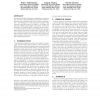Free Online Productivity Tools
i2Speak
i2Symbol
i2OCR
iTex2Img
iWeb2Print
iWeb2Shot
i2Type
iPdf2Split
iPdf2Merge
i2Bopomofo
i2Arabic
i2Style
i2Image
i2PDF
iLatex2Rtf
Sci2ools
ATAL
2007
Springer
2007
Springer
Distributed coordination in uncertain multiagent systems
We consider real-time multi-agent coordination in a dynamic and uncertain domain addressing both distributed state information and partial knowledge of the common reward function. The challenge is to find functional strategies when bounded rationality hinders the ability to encompass the values of possible sample paths of the system. This paper discusses a new approach based on assigning agents to monitor portions of the reward structure for which they aggregate and propagate appropriate profiles which compactly represent relevant information used for policy modification. This approach shows promise as an alternate and potentially superior technique with respect to current decision-theoretic and scheduling approaches.
Related Content
| Added | 07 Jun 2010 |
| Updated | 07 Jun 2010 |
| Type | Conference |
| Year | 2007 |
| Where | ATAL |
| Authors | Rajiv T. Maheswaran, Craig Milo Rogers, Romeo Sanchez |
Comments (0)

